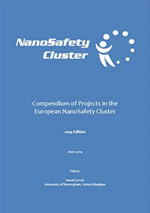Jun 18 2014
The EU NanoSafety Cluster is an initiative to maximise the synergies between the existing FP6 and FP7 projects addressing all aspects of nanosafety including toxicology, ecotoxicology, exposure assessment, mechanisms of interaction, risk assessment and standardisation.
 Compendium of NSC Projects - 2014 edition. Image Credit: European NanoSafety Cluster.
Compendium of NSC Projects - 2014 edition. Image Credit: European NanoSafety Cluster.
About fifty projects are either completed or running and represent a total RTD investment of €137M, from the NMP and other programmes, under FP6 (13 projects, €31M) and FP7 (34 projects, €106M).
These projects together with a significant number of projects supported by government resources in the EU member states and the FP7 associated states, and other projects addressing safety as side objective, represent the valuable efforts of the scientific and industrial research community for progress.
NanoSafety Cluster report
The fourth edition of the Nanosafety Cluster compendium again documents the status of important EU-funded projects on nanomaterial toxicity and exposure monitoring, integrated risk management, research infrastructure and coordination and support activities as well as regulatory-focussed research on nanosafety.
The compendium is not intended to be a guidance document for human health and environmental safety management of nanotechnologies, as such guidance documents already exist and are widely available.
Neither is the compendium intended to be a medium for the publication of scientific data and research results, as this task is covered by scientific conferences and the peer reviewed press.
The compendium aims to showcase the exciting and important European-wide collaborative research being undertaken to ensure the safe implementation of nanotechnologies, and to act as a one-stop-shop for all stakeholders interested in acquiring an overview of current research activities. This years’ compendium contains information on 30 running (or very recently finished) projects, including new entries describing the projects resulting from the last call of FP7, including eNanoMapper, NanoDefine and FutureNanoNeeds. It also includes presentations of several of the projects funded via the SIINN ERA-NET such as INSTANT, NANOHETER and NanOxiMet, as well as two projects funded via the LIFE topic (SIRENA and NanoRISK). In addition, updates from several of the Nanosafety Cluster Working Groups (WGs) are included, outlining their short, medium and long term goals, and progress to date.
The compendium also aims to bring the research community closer together and show them the potential for synergy in their work. It is a means to establish links and communication between them during the actual research phase and well before the publication of their results. It thus focuses on the communication of projects’ strategic aims, extensively covers specific work objectives and the methods used in research, and documents human capacities and partnerships. As such, the compendium supports collaboration on common goals and the joint elaboration of future plans, whilst compromising neither the potential for scientific publication, nor intellectual property rights.
Of course this publication alone will not be able to achieve these targets. However, we hope that it will help the research community to make significant progress towards them. The compendium will continue to be a dynamic, frequently updated, web-based document available free of charge to all interested parties.
Source: http://www.nano.org.uk/